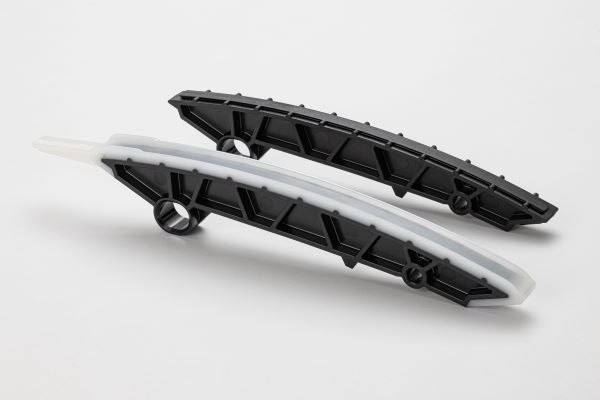Pilot projects with ZF and Pöppelmann demonstrate near-series applications using components for Mercedes-Benz

A recycled PA6 compound was created from the polyamide fraction obtained by solvent-based recycling, validated on a near-series chain guide rail (production: Pöppelmann) for Mercedes-Benz. Photo: BASF, 2025
BASF and its cooperation partners will be presenting two pioneering technologies that enable the recycling of polyamides from end-of-life vehicles at K 2025.
While the recovery of metals from decommissioned vehicles has been successfully practiced for decades, around 200 kilograms of plastic per vehicle often end up being incinerated. BASF's new technologies aim to change this, particularly in view of the upcoming regulatory requirements of the End-of-Life Vehicle Regulation (ELVR).
Pilot projects demonstrate how automotive waste can be used as a material and fed back into a closed cycle for the automotive industry.
BASF has developed an innovative chemical recycling process that sets new standards in the recycling of technical plastics and demonstrated the capabilities in a pilot project. This process makes it possible to recycle even heavily used and contaminated plastic parts - in this case also ZF Group used oil pans from end-of-life vehicles - efficiently and sustainably at the end of their life cycle.
At the core of the process is depolymerization, where the long polyamide chains are broken down at their inherent cleavage points into their original building blocks - the monomers. In the subsequent step, the monomer caprolactam obtained from the depolymerization of PA6 is purified.
This allows potentially disruptive impurities from the material's history of use to be completely removed. These impurities would have remained in the material during mechanical recycling and would have potentially impaired the quality and safety of the recycled material. The material is then re-polymerized into high-quality polyamide, which is further processed into a polyamide compound in accordance with the requirements of the application.
"What used to be considered non-recyclable is now the starting point for high-quality new products," explains Martin Scheuble, Team Leader Circularity Engineering Plastics at BASF.
The successful processing of the recycled material by the project partner ZF Group into a complex, technically sophisticated chassis component - the so-called Stabilizer Link - for Mercedes-Benz is a notable proof of its suitability for practical use. Tests carried out on test specimens and the manufactured components themselves show that depolymerization enables polyamide compounds that can be used without compromising on performance or other chemical and physical properties.
"This project highlights the potential of recycled plastic - even for technically demanding applications - and underlines ZF's innovative strength in establishing sustainable material cycles," says Dr. Michael Lohrmann, Director Materials Technology at ZF, explaining the relevance for the automotive supplier.
The second pilot project is dedicated to the recycling of automotive shredder residue (ASR) - a complex mix of different materials that remain after the removal of mainly metals and glass. Thanks to close cooperation with a recycling company, it has now been possible to extract the polyamides from this mixture in a largely pure form using newly available sorting and processing technology.
The polyamide fraction obtained in this way was used as the starting material for a new solvent-based recycling process as part of the pilot project. In this process, the polymer chain is not split but selectively dissolved with the aid of a suitable solvent, then purified and finally reprocessed into PA6 compounds.
This technology was validated using a chain guide rail in series production at Mercedes-Benz. The components were manufactured and successfully tested under near-series conditions by the project partner Pöppelmann as part of the pilot project.
"The project impressively demonstrates that solvent-based recycling is a practical alternative for plastics that are difficult to recycle mechanically. It makes an important contribution to the holistic circular economy - from the car back into the car," emphasizes Steffen Meyer, Team Leader Production Technology at Pöppelmann.
Subscribe to our newsletter & stay updated.